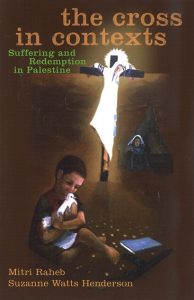By Mitri Raheb and Suzanne Watts Henderson
Orbis Books, February 2017, 160 pages, US$ 20
In The Cross in Contexts: Suffering and Redemption in Palestine, Rev. Dr. Mitri Raheb, a Palestinian theologian, and Suzanne Watts Henderson, a New Testament scholar in the United States, explore the meaning of the cross in both first- and twenty-first-century Palestinian contexts. In the book’s introduction, Dr. Raheb discusses the surprise and wonder he felt at the discovery of how many Palestinian writers, poets, and artists, both Christian and Muslim, used the symbol of the cross as a paradigm for Palestinian suffering. A chapter on Mahmoud Darwish highlights how a re-exploration of his work led to the uncovering of the use of the cross as a symbol by Darwish throughout his life as well. Through these discoveries, Raheb began to question what message these artists were communicating to the Palestinian people through the use of the cross. In this way, the book was born from the exploration of the connection between the cross and the struggle of the Palestinian people. Watts Henderson uses her perspective as an American biblical scholar to consider the redemptive power of the cross in first-century Palestine, what it meant at that time, and what it adds to the narrative. Some of the topics covered in the book include the cross and political power, the cross, state, and religious terror, and the theme of Palestine itself on the cross.

In the conclusion of the book, Dr. Raheb writes:
“The cross has a context, and this context leads to Palestine. So much of the story started there, in a tiny little corridor of human history, in a country the size of New Jersey, surrounded by mighty regional powers. So much of the story has continued, across the millennia, as the people of Palestine—Canaanites, Israelites, Jews, Christians, Muslims—have endured one occupation after another….
“Within this story, one event stands out as a decisive moment of revelation. Somehow, in the crucifixion of their Lord, our ancestors in Palestine were able to find in the midst of suffering a meaning for life.…This revelation gave them the power not only to endure pain, but also to creatively resist empires and oppression. The revelation of the cross … helped them reimagine life in a context marked with death, and to find hope in unexpected places.
“This book stands out because it’s a conversation that crosses boundaries of time and space and culture to bring into clearer view many ways in which Jesus’ death continues to liberate us. It’s a dialogue between first-century Palestine and the Palestine of today. It’s a dialogue between an American and a Palestinian. It’s a dialogue between a theologian and a biblical scholar, a woman and a man, and a professor and a pastor. It’s a dialogue at a crossroad.”

